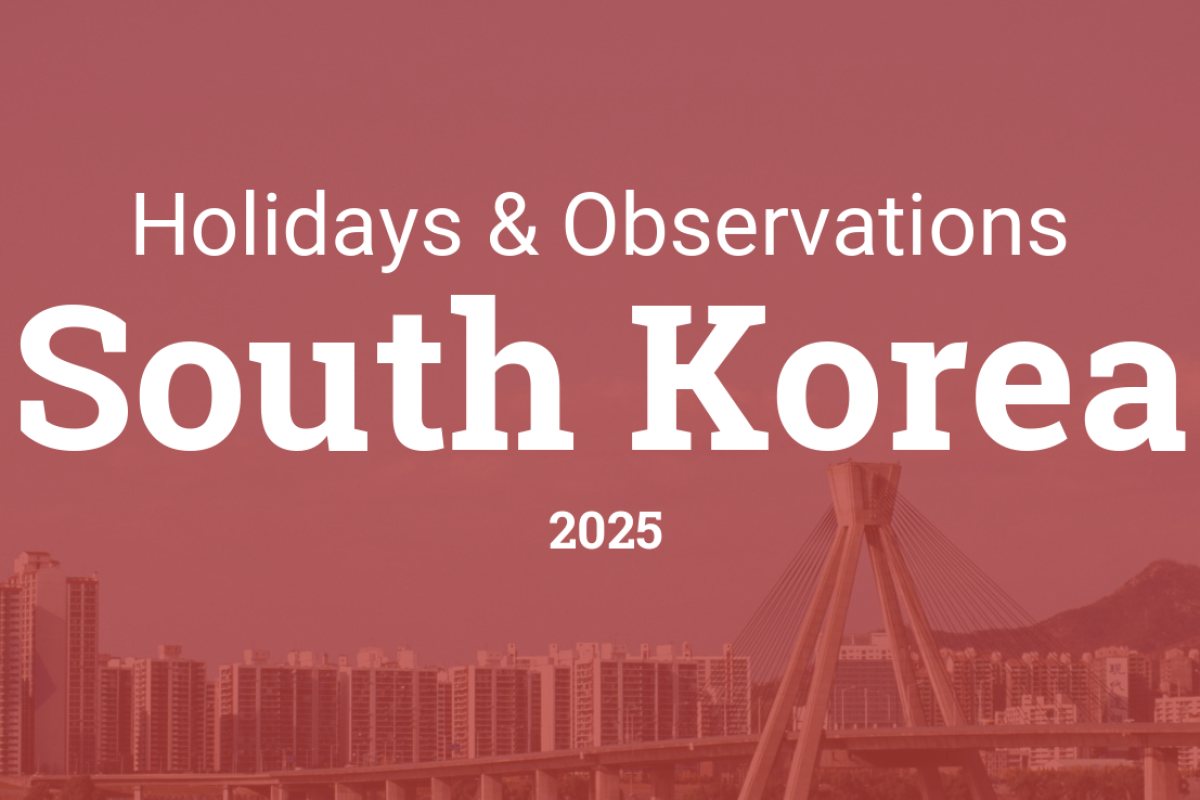South Korea’s 2025 public holiday calendar offers insight into the country’s rich cultural heritage, marked by traditional celebrations and significant historical commemorations. For businesses, understanding these holidays is essential to effectively plan operations and manage employee leave. Here’s an overview of South Korea’s key public holidays in 2025, providing guidance for businesses looking to ensure smooth operations and full compliance.
Key Public Holidays in South Korea for 2025
The following is a list of South Korea’s major public holidays, reflecting important cultural, religious, and historical events celebrated nationwide.
| Date | Holiday | Description |
|---|---|---|
| January 1 | New Year’s Day | Marks the start of the Gregorian calendar year, celebrated with family gatherings. |
| February 27-29 | Seollal (Lunar New Year) | A multi-day celebration marking the Lunar New Year with ancestral rites and family reunions. |
| March 1 | Independence Movement Day | Commemorates the March 1st Movement of 1919, celebrating Korea’s declaration of independence from Japanese rule. |
| May 5 | Children’s Day | A day to celebrate and honor children, often observed with family outings and gifts. |
| May 15 | Buddha’s Birthday | Celebrated by Buddhists with lantern festivals and ceremonies honoring Buddha’s birth. |
| June 6 | Memorial Day | Honors South Korea’s war veterans and fallen soldiers with ceremonies and tributes. |
| August 15 | Liberation Day | Marks Korea’s liberation from Japanese occupation in 1945, celebrated as a national holiday. |
| September 7-9 | Chuseok (Korean Thanksgiving) | A harvest festival involving family gatherings, ancestral rites, and traditional feasts. |
| October 3 | National Foundation Day | Commemorates the legendary founding of Korea by Dangun, celebrated with parades and ceremonies. |
| October 9 | Hangul Day | Celebrates the creation of the Korean alphabet, Hangul, by King Sejong in the 15th century. |
| December 25 | Christmas Day | Observed by Christians in South Korea to celebrate the birth of Jesus Christ, often with gatherings and church services. |
Additional Observances in South Korea
South Korea also observes several culturally significant events that, while not public holidays, are widely celebrated and may impact business operations.
| Date | Observance | Description |
|---|---|---|
| February 14 | Valentine’s Day | Celebrated with gift exchanges among couples, popular in South Korean culture. |
| November 11 | Pepero Day | A local celebration where people exchange Pepero snacks with loved ones. |
| December | Year-End Festivities | Includes various events and gatherings as people celebrate the end of the year. |
Employer Considerations for Managing Public Holidays in South Korea
National vs. Cultural Observances
It’s crucial for employers to recognize both official holidays and other culturally significant observances. Although not all are public holidays, many are important for employees and are celebrated within workplaces. Understanding these observances helps businesses align their operations with employee expectations and local practices.
Managing Public Holidays with EOR/PEO Services
International companies operating in South Korea may benefit from partnering with an Employer of Record (EOR) or Professional Employer Organization (PEO) for efficient holiday management. These services provide assistance by:
- Ensuring Compliance: EOR/PEO providers are knowledgeable about South Korean labor laws and ensure full compliance on behalf of foreign employers.
- Payroll Adjustments: They manage payroll, including adjustments for holiday pay and ensure timely processing.
- Leave Management: EOR/PEO services track public holidays and help with employee leave requests for streamlined workforce planning.
Holiday Pay and Compliance in South Korea
South Korea’s labor laws entitle employees to paid leave on designated public holidays. Key points include:
- Paid Leave: Employees receive paid leave on recognized public holidays.
- Holiday Rates: Employees who work on a public holiday may receive overtime pay or an alternative leave day.
- Substitute Holidays: When a holiday falls on a weekend, companies may offer a substitute holiday on the following workday.
Productivity and Holiday Planning
To maintain productivity and support employee satisfaction, businesses should consider:
- Flexible Work Arrangements: Remote work or flexible schedules can help accommodate holiday needs and employee preferences.
- Advance Communication: Sharing an annual holiday calendar with employees aids in planning and minimizes last-minute disruptions.
- Adjusting Project Timelines: Aligning project deadlines with holiday schedules helps avoid productivity impacts.
- Continuity Planning: Ensuring adequate coverage for essential roles during extended holidays promotes smooth business operations.
Final Thoughts
South Korea’s 2025 public holiday calendar provides an opportunity for businesses to understand and embrace local culture. By planning holiday management in advance, businesses can support employee well-being, enhance compliance, and maintain operational efficiency, benefiting both employees and employers alike.
GlobainePEO – Your Trusted Partner
At GlobainePEO, we help employers navigate the complexities of managing public holidays in South Korea. From ensuring compliance with provincial laws to managing holiday schedules, we provide the support your business needs to thrive. Let us handle your workforce management while you focus on growing your business.

